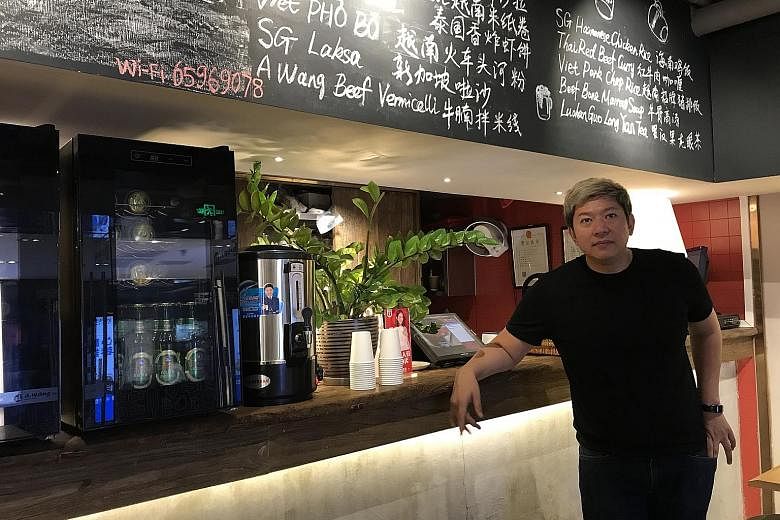From special Singapore food menus and soup nights to discount cards and WeChat groups, these are some ways that two Singaporean restaurateurs attract and retain customers.
One of them, Mr William Ding, 45, came to Beijing after about a year of preparation. The other, Mr Sean Lee, also in his 40s, came with zero knowledge of the food business in China, just two suitcases and his cat.
Both men, who are single, found the going tough but persevered because of their passion for food and a determination to succeed.
Both are university graduates who had good jobs but they pursued their dream of hanging out their own shingle.
Mr Lee is a Peranakan who loves to cook - and is no mean cook, having paid his dues in the kitchens of his grandmother and mother.
Mr Ding, the older of two boys, was his mother's kitchen help from a young age. Weekends were spent at his grandfather's coffee shop in Jalan Besar where he saw and liked how his granddad worked.
"It's a nice feeling to have a place where you are working and also making friends," he said. He wanted that for himself.
A year before he moved to China, he left his corporate communications job to take a psychology course in order to understand human behaviour better, and made frequent trips to China to scout for a place, while doing freelance work.
While Shanghai might have been an easier place to start given that it was more cosmopolitan, he saw an opportunity in the rawness of Beijing's market - it was "big and developing".
He arrived in 2012, prepared for the hard knocks.
Still, when reality bit, it was painful.
The Friday that Mr Ding and his Chinese partner first opened the restaurant, Vanda Room, they had only three tables of diners in all.
To fill tables and raise visibility, they started hosting events for groups including a speed-dating event with an American college alumni association.
As Vanda Room's target customers are in the vicinity of the restaurant - in the largely residential area of Shuangjing, which is close to a business district - on weekday evenings and on weekends, it is open for dinner and supper on weekdays and for lunch and dinner on weekends.
Hard as it was, Mr Ding did not experience the failure that Mr Lee did. Mr Lee had left his advertising and consulting job in 2004 to start a Vietnamese concept restaurant because he saw a trend towards Vietnamese food in Singapore.
But he chose to move to Beijing when an opportunity opened up before the Olympics in 2008.
This venture, a Vietnamese restaurant in the hip Sanlitun area, was a success and he started a second outlet.
But for various reasons including partnership issues, he had to close both restaurants in 2013.
It was an expensive, bittersweet experience that left him wiser, he said.
He started A.Wang Asian Kitchen in 2015 in the basement of an office block, targeting white-collar workers and offering a wide range of South-east Asian food from Vietnamese pho to Thai tom yum, Indonesian mee goreng and Singaporean laksa, with some Chinese favourites like Sichuan pepper noodles thrown in.
Both Mr Lee and Mr Ding are adamant about not "bastardising" their food to suit local palates.
"I have always believed in offering authentic South-east Asian cuisines to my clients," said Mr Lee, adding that South-east Asia is one of the favourite holiday destinations of the Chinese. "They know and have expectations."
Still, Mr Ding admitted that his menu offered food more suited to northern Chinese who like their food salty, oily and not too sweet, such as prawn noodles, black pepper crab and prawn paste chicken (har jeong gai).
On weekends, he might offer Singaporean food to his Singaporean customers that locals don't particularly care for, such as rojak.
Mr Lee has a special Singapore weekend menu with offerings such as mee siam, fried carrot cake, bak chor mee and chwee kway.
"It is to ease my personal cravings and also the cravings of Singaporeans," he said.
It likely also helps draw diners to a quiet office block on a weekend.
The two restaurateurs have their different ways of drawing customers on quiet days.
Mr Ding offers free, nourishing soups on Wednesdays, slow days for Vanda Room, in the hope that customers will order a meal to go with the soup. Mr Lee has live music on Saturday nights.
Mr Ding has a WeChat group for customers, "Vanda Makan Kakis", where members share jokes and exchange information and are informed of new food offerings, specials or events at the restaurant.
So far, their formulas have worked. They have been able to keep their business going and to enjoy the work along the way, though it is a hard slog - they are at their restaurants most of the time.
Said Mr Lee: "Whenever I see smiles on the faces of my clients, it brings a sense of accomplishment... something that is intangible, immeasurable."
Mr Ding said: "I live and breathe the business".


